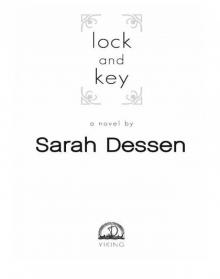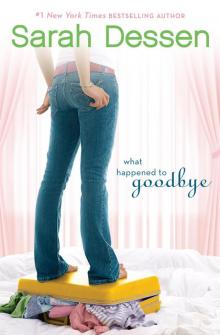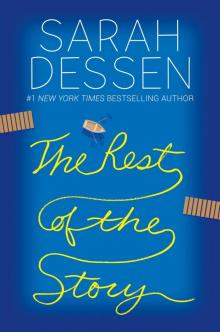- Home
- Sarah Dessen
What Happened to Goodbye Page 6
What Happened to Goodbye Read online
Page 6
“It’s a storm shelter. It’s not like he built it, or something.”
“Do you even hear what you’re saying?” Heather sighed loudly. “Look, you know I love Dave. But he is kind of a freak.”
“Isn’t everybody?” Riley said, picking out another pretzel.
“No.” Heather adjusted her bosom again. “I, for instance, am completely normal in every way.”
Riley snorted, eating another pretzel, and they were both quiet for a moment. Now, I thought. Now is when I introduce myself as Liz Sweet, clear this whole thing up. Then I’d just have to do it again in homeroom tomorrow and I’d be all set, just where I needed to be for all this to work the way I wanted it to. But for some reason, standing there, I couldn’t. Because despite my best efforts otherwise, Mclean already had a story here. She was the girl who’d discovered Dave on the back porch, then taken refuge in his hideout. The girl at the party, the girl Deb welcomed in her own spazzy freaker style. She was not the same Mclean I’d been for the first fourteen years of my life. But she was Mclean. And not even a new name could change that, now.
Heather looked at Riley. “So, speaking of Eggbert, what’s the story? Did his parents yank him out of here for good, or what? ”
Riley shook her head. “I saw him after homeroom. He said they were letting him stay, but he had tons of hoops to jump through. They’ve been meeting about it with Mrs. Moriarity all morning.”
“God, that sounds miserable,” Heather groaned. To me she added, “Mrs. Moriarity is the principal. She hates me.”
“She does not,” Riley said.
“Actually, she does. Ever since that whole, you know . . . incident when I backed into the guardhouse. Remember?”
Riley thought for a second. “Oh, right, that was bad,” she said. Then she looked at me and added, “She’s a horrible driver. She never looks when she merges.”
“Why should I always have to do the looking? ” Heather asked. “Why can’t other people look out for me?”
“The guardhouse is an object. It’s defenseless.”
“Tell that to my bumper. I’m still paying off the money I owe my dad for the damn body shop.”
Riley rolled her eyes. “I thought we were talking about Dave.”
“Right. Dave.” Heather turned to me. “My point is, he’s, like, an administrator’s wet dream. Boy genius who skipped, like, all of junior high and was taking college courses, then came to this hellhole by choice. Which is something I’ll never understand.”
“He wanted to be normal,” Riley said quietly, picking out another pretzel. Then, glancing at me, she explained, “Dave had never been in public school. He was actually going to go to college early, because he’s so smart and got moved up so much. But then he decided he wanted to, you know, live like a regular teenager. So he got this after-school job making smoothies at Frazier Bakery, where my boyfriend at the time was working.”
“Nicolas,” Heather said. She sighed. “Man, that boy could blend. You should have seen his biceps.”
Riley ignored this, continuing, “Dave and I had actually known each other when we were kids, but we’d fallen out of touch. Once he was working with Nic, though, we picked right back up where we’d left off and started hanging out.”
“At which point he fell totally in love with her,” Heather told her. Riley shook her head. “What? It’s the truth. I mean, he’s supposedly over it now, but there was a time—”
“He’s like a brother to me,” Riley said. “I could never think of him that way.”
“Also, she only dates dirtbags,” Heather told me.
Riley sighed. “True. It’s a sickness.”
Heather gave her a sympathetic look before reaching over, patting her back the same way I’d watched her do earlier from a distance. Then she looked at me. “So, you going to sit down or what? You’re making me nervous, just standing there.”
I glanced back at Deb, alone under her tree, and then the random groups, as intricately divided as genuses in the animal kingdom, spread out between us. “Sure,” I said, stuffing my welcome bag into my backpack. “Why not.”
After school, I took a bus to Luna Blu, then cut down the alley to the kitchen entrance. I found my dad in the cramped office—a converted supply closet, by the looks of it—sitting at a desk. There were papers spread out all around him, and he had his phone to his ear.
“Hey, Chuckles. It’s Gus,” he was saying. “So, look, it’s not as bad as you feared. That said, though, it’s far from good.”
Charles Dover was the owner of EAT INC. A former DB and NBA player, he was over six seven and built like a Mack truck, the last person anyone would ever want to call a name like Chuckles. My dad, though, had been one of his best friends since his own glory days riding the Defriese bench. Now Chuckles was a TV commentator and a multimillionaire. He traveled around the country a lot for the network, and he loved to eat, which is how he’d ended up owning a company that bought up and rehabbed restaurants before selling them off to new owners. Mariposa had been his favorite restaurant whenever he was in town for Defriese games, and now that he’d lured my dad away from there, he worked him hard. But he also paid well and took very good care of us.
I dropped my backpack on the floor of the office, not wating to disturb them, then headed out into the restaurant proper. It was empty except for Opal, who was standing by the front door, surrounded by a stack of cardboard boxes. The UPS man, who was parked outside, was in the process of wheeling in even more.
“Are you sure there hasn’t been some kind of mistake?” she asked him as he put another one by the hostess stand. “This is a lot more than I was expecting.”
He glanced at a clipboard that was balanced on the top box. “Thirty out of thirty cartons,” he said, then handed it to her. “All here and accounted for.”
Opal signed the sheet and gave it back to him. She was in a cotton long-sleeved shirt printed with cowboys and horses, a black miniskirt, and bright red boots that came up past her knees. I hadn’t figured out yet if her look was punk or retro. Maybe petro.
“You know,” she said to the UPS guy, “it’s pathetic what a person has to do to secure ample parking in this town. Pathetic .”
“Can’t fight city hall,” he replied, ripping off a sheet and handing it to her. “Hey, you got any more of those fried pickles lying around? Those I got here the other day were wicked good.”
Opal sighed. “Et tu, Jonathan?” she said sadly. “I thought you loved our rolls!”
He shrugged. “They were good, for sure. But those pickles? Crispy and crunchy, and, you know, pickly? Damn! They’re just beyond.”
“Beyond,” Opal repeated, her voice flat. “Fine. Go back and ask Leo to throw a few in for you.”
“Thanks, doll.”
He walked past me, nodding, and I nodded back. Opal put her hands on her hips, surveying the boxes, then added over her shoulder, “And tell him to send someone out here to help me carry these upstairs, would you?”
“Will do,” the delivery guy said, pushing into the kitchen, the door swinging out, then back again behind him. I watched as Opal bent down over one of the cartons, examining it, then pushed herself back to her feet, rubbing her back.
“I’ll help you, if you want,” I said.
She spun around, startled, her face relaxing—a bit—when she saw me. “Oh, thank you. The last thing I need is for Gus to come out here and start asking a bunch of questions. He’s already out to get me as it is.”
I waited a beat, for her to realize what she’d just said. One. Two. Then—
“Oh, God.” Her face reddened. “I didn’t mean that how it sounded. I just—”
“It’s okay,” I told her, walking over and picking up one of the smaller cartons. “Your boxes of secrets are safe with me.”
“I wish they were boxes of secrets,” she said with a sigh. “That would be infinitely less humiliating.”
“Then what are they?”
She took a breath, then said,
“Plastic buildings, trees, and infrastructure.”
I looked down at the box. MODEL COMMUNITY VENTURES, read the return address.
“It’s a long story,” Opal continued, hoisting a box onto her hip. I followed her into the side dining room. “But the condensed version is that I sold my soul to the head of the town council.”
“Really.”
“I’m not proud.” She went down a small hallway, past the bathrooms, then bumped open a doorway with her hip, revealing a narrow set of stairs. As we started up them, she said, “They were about to shut down the parking lot beside us, which would have been totally devastating, business-wise. I knew they were looking for someone to take on the project of assembling this model of the town for the centennial this summer, and that nobody wanted to do it. So I volunteered. On one condition.”
“Parking?”
“You got it.”
We reached the top of the stairs, entering a long room lined with tall, smudged glass windows. There were a few tables stacked along one wall, some empty garbage cans, and, inexplicably, two lawn chairs right in the middle, an upended milk crate between them. On it was a pack of cigarettes, an empty beer bottle, and a fire extinguisher.
“Wow,” I said, setting down my box. “What is this place?”
“Mostly storage now,” she replied. “But as you can tell, the staff have been known to use it on occasion.”
“To set fires?”
“Ideally, no.” She walked over, picking up the fire extinguisher and examining it. “God! I have been looking everywhere for this. The kitchen guys are such kleptos, I swear.”
I walked over to one of the big windows, peering out. There was a narrow balcony, made of wrought iron, over which I had a perfect view of the street below. “This is nice,” I said. “Too bad you can’t seat people up here.”
“We used to,” she said, picking up the beer bottle and tossing it in a nearby trash can, followed by the cigarettes. “Way back in the day.”
“Really,” I said. “How long have you been here?”
“I started in high school. It was my first real job.” She picked up the milk crate, moving it to the opposite wall, then folded the chairs, one by one. “Eventually, I left for college, but even then I came back and waited tables in the summers. Once I graduated, I planned to get a full-time job with my double degree in dance and art history, but it didn’t exactly work out.” She looked at me, then rolled her eyes. “I know, I know. Who would have guessed it, right?”
I smiled, looking back out the window again. “At least you did what you liked.”
“That has always been my defense, even when I was flat broke,” she said, wiping off the milk crate with one hand. “Anyway, I was back here and unemployed when the Melmans decided they needed someone else to take over the day-today for them. So I agreed, but only on a temporary basis. And somehow, I’m still here.”
“It’s a hard business to get out of. Sometimes impossible,” I replied. She looked at me. “That’s what my dad says, anyway.”
For a moment, she was quiet, instead just taking the folded chairs and stacking them against the wall. “You know,” she said finally, “I understand he’s just here to do a job, and that we needed to make some changes. I’m sure he’s a good guy. But it just feels . . . like we’re being invaded. Occupied.”
“You say it like this is a war.”
“That’s kind of how it feels,” she replied. She sat down on the milk crate, propping her head in her hands. “I mean, with half the menu gone, and cutting out brunch. I think maybe I should have gone with the rolls. Out with the old, in with the new, and all that.”
She looked tired suddenly, sitting there saying this, and I felt like I should say something supportive, even though we hardly knew each other. Before I could, though, there was a bang from the stairs, and the skinny cook I recognized from the alley a few days earlier appeared on the landing, carrying a box. My dad, also with one in his arms, was right behind him.
“Yo, Opal, where you want us to put these? ” the cook asked.
Opal jumped to her feet. “Leo,” she said, quickly walking over to take the box from my dad’s arms, “I can’t believe you asked Gus to do this.”
“You said to get someone to help me!”
“Someone,” she muttered, under her breath. “Not the boss, for God’s sake.”
“It’s fine,” my dad said easily. To me he added, “Mclean! I didn’t even know you were here. How was the rest of the day?”
Opal turned, looking at me, confused, and I suddenly remembered I’d told her my name was Liz. I swallowed, then said, “Okay, I guess.”
“Gus, seriously,” Opal said to him. “I’m so sorry. . . . It will only take me a second to get the rest of those boxes up here, I promise.” She shot Leo a dark look, but he was just standing there, fiddling with the strings of his apron.
“What?” he said as she continued to glare at him. “Oh. You mean me?”
“Yes,” she replied, sounding more tired than ever. “I mean you.”
He shrugged, banging back down the stairs. Opal still looked mortified, but my dad hardly seemed to notice as he walked over to stand beside me at the window, looking out at the street.
“This is a great space,” he said, glancing around him. “Did it used to be dining room?”
“About ten years ago,” Opal replied.
“Why’d they stop using it?”
“Mr. Melman felt people were too slow going up and down the stairs. All the food was cold once it got here, because the kitchen was so far away.”
“Huh,” my dad said, walking over to one of the walls and knocking on it. “In such an old building, I’m surprised there wasn’t a dumbwaiter.”
“There was,” Opal told him. “But it never worked right. You’d put your food in and never see it again.”
“Where was it?”
She walked over to the wall by the stairs, pushing aside one of the tables there. Behind it, on the wall, you could see the imprint of something square, protruding slightly. “We had it plastered over,” Opal said. “Because people kept riding in it after closing. Serious liability.”
“No kidding.” My dad walked over, checking it out. As he did, Opal glanced at me again, and I wondered what she was thinking.
“So,” my dad said, turning back to the room proper. “What’s with the boxes? I didn’t realize we had a big order coming in today.”
“Um,” Opal said, as Leo reappeared, carrying three boxes stacked precariously, one on top of another. “We didn’t. This is . . . something else.”
My dad looked at her. “Something else?”
“I was just telling Liz”—she glanced at me, and I felt my dad do the same, though I didn’t look at him—“that it’s this model for the town council. They needed someone to run the project and a place to do it in. And they were about to shut down our parking lot, so I kind of volunteered.”
She trailed off, surveying the various cartons dispiritedly as Leo added his to the collection. My dad said, “What’s it a model of?”
“The town. It’s for the centennial this summer,” she replied. She pulled a piece of paper out of her back pocket, reading aloud from it. “‘Providing both a community project and public art, this living map will allow your citizens to see your town in a whole new way.’ ”
“Looks like it might take up some space,” my dad said.
“I know.” She shoved the paper back in her pocket. “I didn’t realize how big it was. I’ll find another place for it, and soon. I just have to make some calls.”
“Yo, Opal!” a voice yelled up the stairs. “The linen guy is here and our towel order’s short. And that lady’s still on hold for you.”
“What lady?”
“The one Leo told you about,” the voice replied.
Opal turned to Leo, who was standing the window. “Oh,” he said. “You, um, have a phone call.”
She said nothing, just gave him a look before heading downs
tairs without comment. My dad glanced at Leo, then said, “Once all the boxes are up, you’ve got peppers to slice. And make sure that walk-in’s clean by opening. No grit anywhere, and Windex the door.”
“Sure thing, boss man,” Leo said less than enthusiastically.
My dad watched, his expression unreadable, as Leo ambled across the room and down the stairs. Once the door at the bottom banged shut, he said, “I can’t tell if this is a restaurant or a charity foundation. I mean, that guy can’t even work a spray bottle.”
“He does seem a little useless,” I agreed.
“It’s epidemic here.” He walked over to the windows again, looking out. “Unfortunately, I can’t fire everyone. At least not right away.”
I stood with him, watching the street below. It was a pretty spot, framed by tall trees on either side, bending toward us. “Opal seems nice.”
“I don’t need her to be nice,” he said. “I need her to take control of her staff and implement the changes I tell her to. Instead, she argues every single point, wasting endless amounts of tim
We were quiet for another moment. Then I said, “Did you know she’s worked here since she was in high school?”
“Yeah?” He didn’t exactly sound interested.
I nodded. “It was her first job. She really loves this place.”
“That’s nice,” he said. “But all the love in the world won’t save a sinking ship. You have to either bail or jump overboard.”
I thought of Opal, sitting on that milk crate, looking so tired. Maybe she was ready to find an island somewhere in need of a dancer or art historian, and my dad was doing her a favor by giving her a plank to walk. I wanted to believe that. It was part of the job, too.
“Look, I’m sorry for the outburst. I’m in a crap mood right now,” he said, sliding a hand over my shoulder. “Hey, want to come down for the staff meal? It’s the first run of the all-new menu. I could use someone there who actually likes me.”
“I’m your girl,” I said.
He smiled at me, and I followed him to the stairs. We were halfway down when he paused, looking back at me. “She called you Liz,” he said. It wasn’t a question, exactly. But I knew what he was asking.

 Just Listen
Just Listen Along for the Ride
Along for the Ride This Lullaby
This Lullaby Once and for All
Once and for All Lock and Key
Lock and Key The Truth About Forever
The Truth About Forever Someone Like You
Someone Like You What Happened to Goodbye
What Happened to Goodbye Dreamland
Dreamland Keeping the Moon
Keeping the Moon The Rest of the Story
The Rest of the Story The Moon and More
The Moon and More What Happens to Goodbye
What Happens to Goodbye